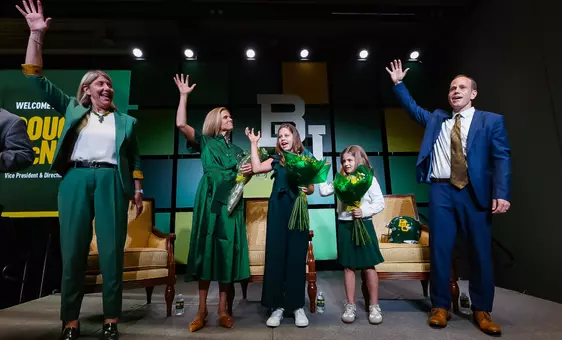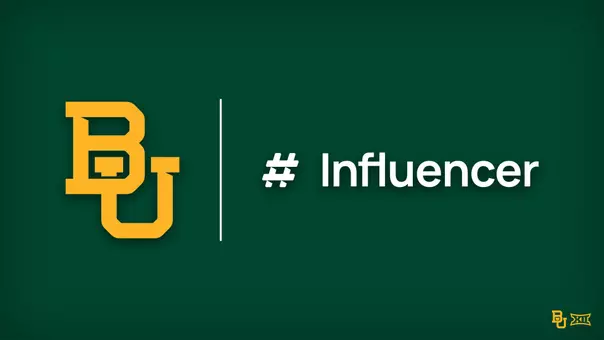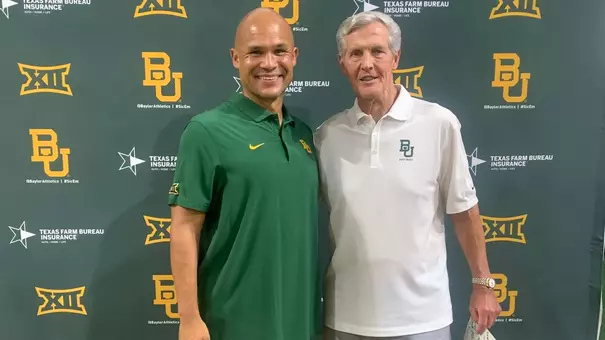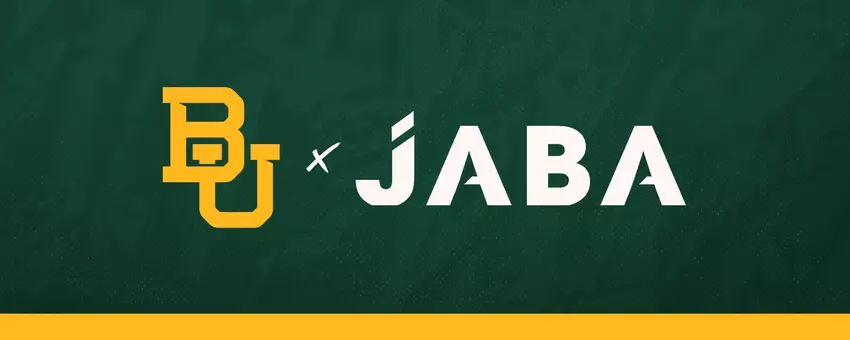Odell James Living Proof of Academic Services Helping Student-Athletes
11/3/2004 12:00:00 AM | General
Nov. 3, 2004
By BRICE CHERRY
When Odell James arrived on the campus of Baylor University in the summer of 1995, he arrived with a reputation as a cannon-armed, ultra-athletic quarterback who could read defenses quicker than Albert Einstein could read an algebraic equation.
What many fans didn't realize was that James had trouble reading his playbooks and his textbooks and even his own notebooks, because he suffered from the learning disability known as dyslexia.
Today, James reads constantly, particularly books on tape, and each week prepares to teach Sunday School using a notebook and color-coded index cards. While experts say that it's impossible to ever truly conquer dyslexia, James is living proof that drastic improvements can be made. In addition to earning a Baylor diploma, James also has a position he loves in the BU football program as an assistantdirector of football operations and assistant strength coach.
And he says he owes it all to the OALA.
The OALA is, in short, the Office of Access and Learning Accomodations, a little-known Baylor department that actually services a large number of students with disabilities. OALA director Dr. Sheila Graham-Smith said that the three-person department currently assists more than 690 students, including around 30 student-athletes, helping them cope with all manner of disabilities,whether cognitive, psychological or physical.
James said that he wouldn't be where he is today without the lessons he learned in the program.
"I'd have never made it," he said. "I really had a lack of teaching all through school. Because I was a highly-recruited prospect, I guessteachers let some things slide, just passed me along. They didn't really realize that I couldn't read very well, or at least they didn't do anything about it. ...But Ms. Graham, she wouldn't let me fail."
Graham-Smith has worked with hundreds of Baylor athletes during her eight-year tenure in the program, and her on-campus office is adorned with autographed photos of many prominent BU sporting heroes. Oftentimes, she isintroduced to them before they ever ink their letter of intent.
"Most of the recruiters know about the student-athlete's (academic) situation before they get here," Graham-Smith said. "So they use our department as part of the recruiting process. The student-athlete or the parent or the high school coach says, 'This is the situation with this athlete, what kind of programs does your school offer?' And our coaches here say, 'Oh, we have an excellent program that will really serve your needs.' We're a bigger part of the recruiting process than anybody realizes."
Graham-Smith still vividly remembers when James arrived on the BU campus as a highly-regarded recruit out of Aldine MacArthur. "His head was so big he couldn't get through that door," she said. "He was going to be the next No. 1 NFL whatever. Now he says, 'The NFL's not it.' "
As with many of the students who come through her office, Graham-Smith quickly developed a rapport with James, so much so that all these years later both the instructor and the former student now view their relationship as a mother-son kind of bond. After all, they've been through a lot together.
"I WAS VERY FORTUNATE with Odell in that when we first started, we only had about 60-something students, so I got to spend a lot of time with him," Graham-Smith said. "I spent a lot of quality time with Odell and we got to be really close. Then in the summertime, when things were slower, I made a pact with him. I said, 'OK, Odell, are you willing to really bring your reading level up?' We made a commitment. I told him, 'I will work with you four hours a day if you are willing,' and I did. I said, 'If you put in the work, I'll put in the work.'So we worked four hours a day for a whole summer, and it paid off."
For James, who was always an interview favorite amongsportswriters for his engaging personality and thoughtful answers to postgame questions, work ethic was never the problem. Neither was his intelligence. Heck, Einstein himself was a dyslexic.
"That's the thing about learning disabilities that many people don't understand," Graham-Smith said. "It doesn't mean that someone isn't intelligent, not at all. It's actually a gap in a person's IQ and their performance. Whereas you or I may have an IQ right here and a production level right below that, a person with a disability might have an IQ up here and a production level way down here (moving her hands a couple of feet apart)."
So how does the OALA seek to improve a student-athlete's production level? By all manner of ways, actually. One method the department employs is administering whatit calls "strength finders" tests, in whichadministrators seek to capitalize on a student's strengths rather than point out his or her weaknesses.
For James, the most important lesson he learned revolved around getting organized.
"THEY WOULD HELP YOU organize your syllabus, give you a daily planner and a weekly planner, help make sure you're at the places you need to be," James said. "They would look over your paper, analyze it and find corrections, just really help you get organized and stay on top of things."
"The number one thing we do with our students is time management," Graham-Smith agreed.
Depending on the learning disability, many of the students in the OALA program are also granted certain accomodations, such as the right to tape record a lecture or to take a test orally. Graham-Smith said that a dyslexic, for example, reads in such a cumbersome, choppy manner that by the time they've reached the answers on a multiple-choice exam, they've forgotten what the question was. So the students are allowed the opportunity to take the test orally with the professor, or they're given an extended time period.
"That allows them to succeed," Graham-Smith said. "It's not cheating. But you have to educate the professors, too, because some of them feel that it is. They don't always get it."
The OALA director said that James, however, did get it. During his time in the program, the Baylor quarterback-turned-safety improved by leaps and bounds in his academic development and organizational skills.
"He just desperately wanted to learn. There's nobody that worked harder than him," Graham-Smith said. "I mean, he was like a sponge. You talk to any of his teachers here, and they'll say that Odell did whatever they asked him to do."
AS SUCH, GRAHAM-SMITH became one of James' biggest fans. She said that over the years she has enjoyed watching all of her student-athletessucceed in their various athletic endeavors. And she usually has a pretty good handle on how they'll perform.
"If they don't succeed academically, they're not going to succeed athletically," she said. "When you see it up close, they mirror each other. If they haven't had a good week academically, I can see that they're not going to do well on the field or on the court that week. I can guarantee you that they don't feel good about themselves, so they're not going to feel good about themselves athletically, either."
On the flip side, a progressive week coping with their disability and succeeding in their studies can yield some big plays for Baylor's top athletes, the OALA director said. And she loves to see it.
Graham-Smith said that she views nearly all of the students who come through the program as "her children." It's not just lip service, either - many of them actually stop by her house for tutoring and study sessions.
"It's the most fulfilling job," she said. "I tell everyone that I have the best job on campus."
James was one of those athleteswith whomthe director has always maintained a close friendship. "It's not just a relationship like a student to a professor," James said. "I look at her as my home-away-from-home mother. She's always been there to help so many of us."
Even after James' graduation, the pair have remained tight. Graham-Smith traveled to the hospital for the births of each of James' three children, and James was there when the professor got married three years ago.
But one story sums up their unique bond. Graham-Smith has been diagnosed with lupus andher health has taken some bad turns over thepast year. During one particularly frightening trip to the hospital, she was lying in her bed when she heard the booming voice of James asking a nurse, "I'm looking for Dr. Graham."
James brought his mentor flowers and chatted with her for a long while before Graham-Smith began to tire.
"So Iasked him, 'Odell, will you pray with me before you leave?' " Graham-Smith said. "And he said. 'I'd love to, Dr. Graham.' So Odell gets up and gets on his knees and puts this big old hand on me and just goes, 'Goooooood,' with this big voice, 'God, you have to make this woman well. This is our mother, and there are so manyboys like me at Baylor who need her.' "
The professorsaid she looked at James, who was crying, and then at her weeping husband as well, and her heart melted.
"I'm going, 'I'm just a horrible person,' " she said. "But then I started thinking, 'This is what Baylor is all about.' I just wished that development was sitting there, that the success center people were sitting there, listening to what Odell James was talking about. That's what we're all about. We're about helping them academically, helping them spiritually and helping them get on with their life."



















